Last Updated on April 11, 2023
Affectionately known by nicknames like Gentle Giant, Leo, or Gentle Lion, the Leonberger is a sizable dog breed that’s more of a bark than a bite canine.
These giant dogs can be intimidating, but they’re also sweet and loving companions, as long as you’re on the right side of the fence.
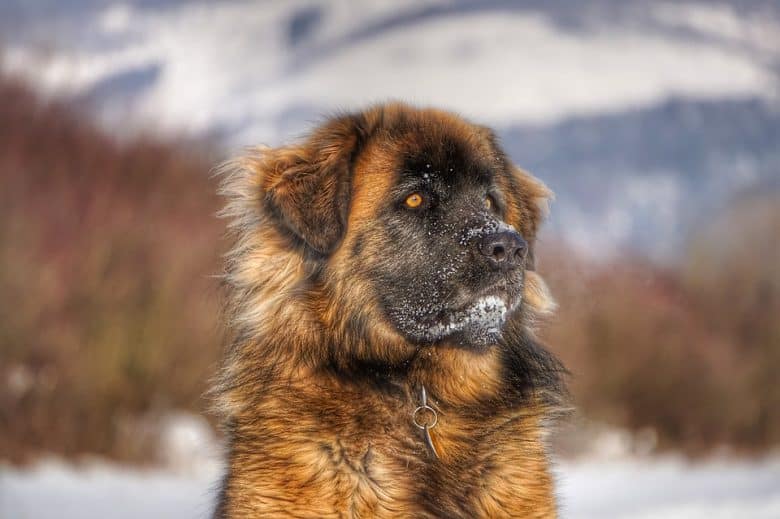
Leonbergers may look fascinating now, but there’s more to know about this towering purebred. Stay with us and keep scrolling.
Quick Navigation
- 1 Where do Leonbergers come from?
- 2 What does the Leonberger dog look like?
- 3 Do Leonbergers make good pets?
- 4 How to take care of your Leonberger
- 5 Health problems that Leonbergers may have
- 6 What is the average cost of a Leonberger puppy?
- 7 Pros & Cons: Should I get a Leonberger?
- 8 Further reading: Similar breeds to Leonberger
- 9 Reference
Where do Leonbergers come from?
Heinrich Essig, a 19th-century German politician and mayor of Leonberg, Germany, created this breed and named them after the town.
The interesting history of the Leonberger dates back to the 1930s. This canine was mixed with a Landseer Newfoundland and a Saint Bernard.
Later, the Great Pyrenees was added into the bloodline, making them super large dogs!
Essig wanted to create a majestic dog that would walk proudly beside European royalty. And they did, including walking alongside the Prince of Wales, Tsar Alexander II, and Napoleon III.
The dog represented the lion of Leonberg’s coat of arms.
Other notable personalities that owned this pooch are Guiseppe Garibaldi, Sergei Rachmaninoff, and Richard Wagner.
World War I almost saw the extinction of the breed. By the end of World War II, only eight “Leos” remained.
But despite their origins and regal background, Leos have always been a versatile breed.
They’re excellent working dogs whether in waterfronts, pastures, or farms. They’re also great swimmers. With their physique, they consider cart-pulling as an enjoyable outlet.
The American Kennel Club (AKC) recognized this purebred and categorized them under their Working Group.
Some of the organizations that also recognize Leonbergers are the National Kennel Club (NKC), the Fédération Cynologique Internationale (FCI), the Canadian Kennel Club (CKC), and American Canine Registry (ACR).
What does the Leonberger dog look like?
According to its AKC breed standard, this purebred is a regal, graceful, and elegant dog, despite being brawny. They have a black facemask with lush triangular ears on the sides and kind eyes that are dark-brown.
It has a well-built body with balanced and firm legs that help a Leo move with an easy, elastic gait.
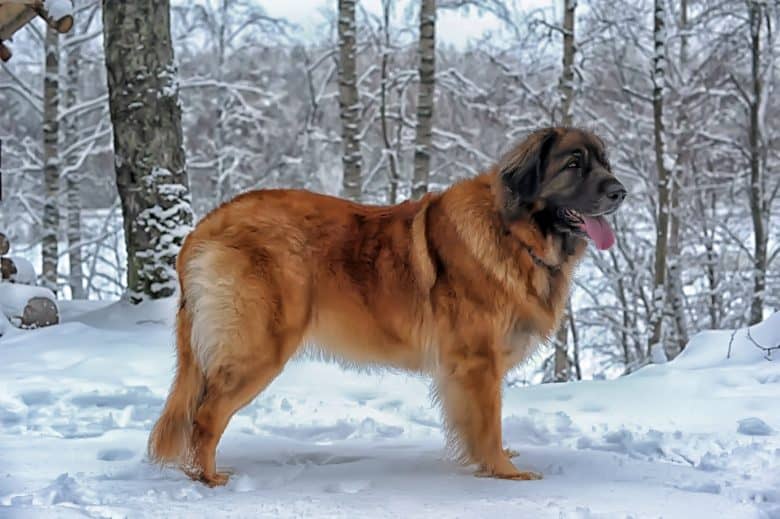
Is the Leonberger one of the biggest dog breeds in the world?
They may belong in the same family, but the English Mastiff is considered the biggest dog breed in height and weight. Leos made it into the top 10, though.
Male adult Leonbergers are 28 to 31.5 inches (71 to 80 cm) tall and can weigh 110 to 170 pounds (50 to 77 kg).
Females are a bit smaller. They have a height of 25.5 to 29.5 inches (65 to 75 cm) and a weight of 90 to 140 pounds (41 to 63.5 kg).
A Leonberger puppy usually reaches its full-grown size around 1 year of age.
With that said, this Gentle Lion can adapt to apartment living as long as it gets its daily exercise. Still, this canine would thrive better in a spacious home with a large yard to roam freely in.
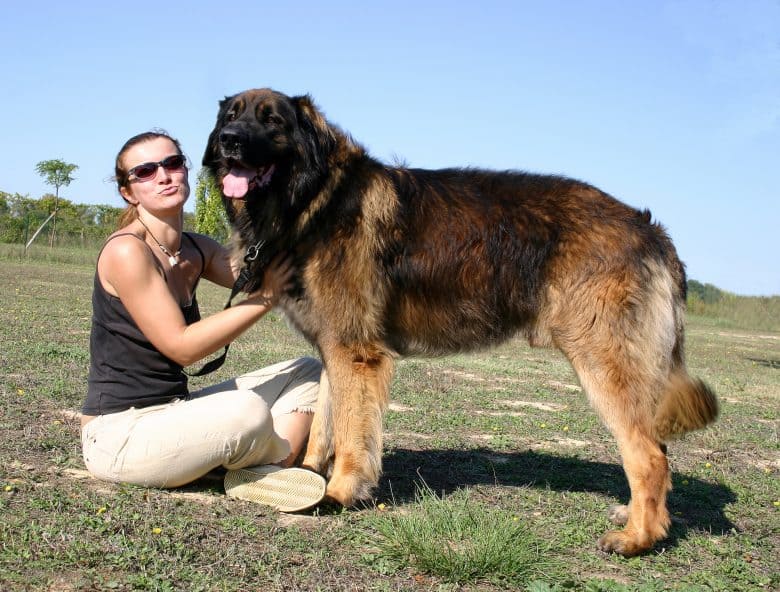
The coat & colors of Leos
Working breeds usually have a water-resistant double coat that protects them from elements, especially when doing their tasks outdoors.
Leonbergers have an outer coat that’s long, straight, and durable. Their undercoat is fluffier and keeps them cozy.
Males have an impressive lion-like mane around their chest and neck, that they may fool some unsuspecting passersby.
Their coat colors include red, golden to red-brown, sandy, or even lion-yellow, with a black mask.
Do Leonbergers make good pets?

Leonbergers are fantastic family dogs, and their wonderful temperament is a notable characteristic. They’re friendly, self-assured, intelligent, and trainable.
They’re submissive to family members and great towards children. They can adjust to new dogs and other pets, including cats.
However, because Leos are so big, you should never leave young kids alone with them. They’re playful and energetic and often have no idea about their size.
Try not to swoon with this adorable baby and Leonberger video compilation!
Leos are also loyal and make excellent guard dogs. Strangers are generally treated with composure, but when threatened, they’ll intervene. That deep bark and impressive size will surely turn away the bad guys.
Do Leonbergers bark a lot?
Canines bred to protect usually have a tendency to bark. As companions that prefer their human presence, they can be vocal if left alone for a long time.
If their favorite person has been away for a while, they can get separation anxiety.
Getting upset or anxious makes Leonbergers suck on their toys or blankets, and those dogs who do this are fondly called “Suckybergers.” It’s a behavior that Leos do to self-soothe.
To ensure that your giant dog ends up as a well-behaved pooch, training should start as early as possible – before they reach 20 weeks old.
Most Gentle Lions trained and socialized are easy to train, so don’t wait for things to get out of hand. Obedience training would be vital with these intelligent dogs, too.
With their build, they can even serve as water rescue canines.
How to take care of your Leonberger
Owners who are experienced can consider this breed to have moderate needs, but some may say they’re high maintenance.
And just because they’re bred to work outdoors doesn’t mean they have to stay outside, as well. They’re well-suited for cold climates, but responsible owners should always have their pets live with them indoors.
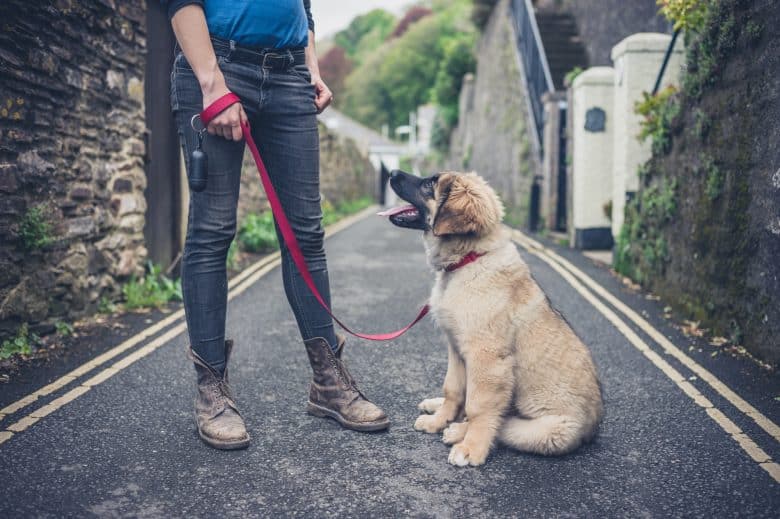
How much exercise do Leonbergers need?
With high energy levels, this gentle giant would suffice with at least 1 hour of exercise a day. Aside from that, your Leo can burn off her extra energy in the spacious yard.
Without sufficient exercise, Leonbergers often become destructive and unruly, especially in the adolescent phase. And since they are so large, this can be incredibly difficult to deal with. Enough exercise is, therefore, essential.
Grooming Tips: Do Leonbergers shed?
This purebred is not a hypoallergenic dog. In fact, they’re heavy shedders that are said to have spawned cottage industries – Afghan blankets and dog-hair sweaters.
They shed all year-round and can be managed with weekly brushing.
Dematting may be required to keep hotspots at bay, especially when the weather conditions are damp or wet.
Baths should only be given when necessary, like when your dog is visibly dirty and seems to have a smell, to avoid damaging that beautiful double coat.
Don’t forget to do a weekly checking and cleaning of her ears, and trimming her nails at least once every two weeks. A groomer can help you with all these tasks, too.
Feeding your Gentle Lion
What you feed your Leo and how much should be based on her body weight, age, activity level, and health.
Generally, an adult Leonberger would require about 3 to 5 cups of high-quality dog food daily. To keep your fella full longer, divide her nom noms into three meals.
Treats, while useful in training, can cause weight gain. Allot 10% of their diet for it, but no more than that.
Health problems that Leonbergers may have
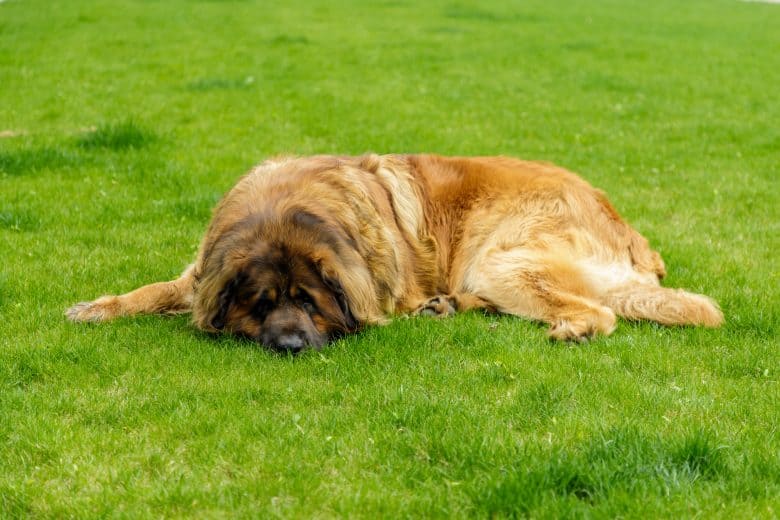
For a giant dog breed with a lifespan of 9 years, the Leo is strong and healthy. It may seem like a short amount of time to have a lion-like pooch, but it’s an expected life expectancy for giant breeds.
It’s also a fact that all dogs can face specific health issues.
Hip dysplasia, a common issue in large breed dogs, has been well controlled through careful breeding.
Watch out for bloat or gastric torsion. This can be avoided by feeding your pal smaller meals or using a slow feeder.
The Leonberger dog breed can inherit or develop heart problems and inherited Leonberger paralysis/polyneuropathy.
You can also monitor them for other health problems like elbow dysplasia, digestive disorders, osteosarcoma, and allergies.
For eye problems, they may develop cataracts, entropion/ectropion eyelids, and progressive retinal atrophy. Fortunately, the Leonberger Health Foundation is researching how to alleviate these tendencies.
Meanwhile, the most common cause of death for Leonbergers is cancer.
What is the average cost of a Leonberger puppy?
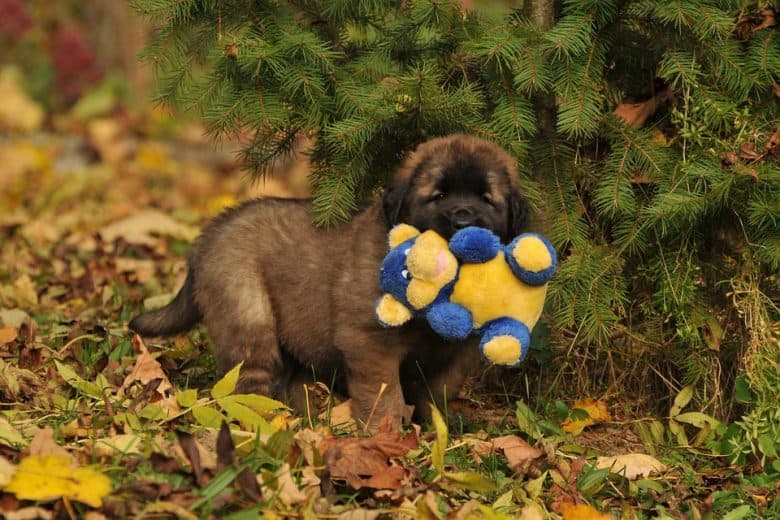
This is a very popular breed, so it can be quite hard to find one. But if you do, Leonberger puppies can cost anywhere between $1,200 to $2,000 each.
Some can get more expensive as the price can be affected by different factors like pedigree, gender, and the number of pups available. A Leonberger’s litter size can range from 6 to 8 puppies.
Other than that, consider expenses that will go on top of their actual price, like dog food, medical bills, etc. If that doesn’t discourage you, it’s time to browse for Leonberger puppies for sale online.
Leonberger breeders & rescues
We recommend looking at the available puppies on the AKC Marketplace, as well as the Leonberger Club of America.
But before you make any purchase or sign a contract, it’s best to do your research and prepare a questionnaire to ensure that you’re buying a healthy puppy from a reputable breeder.
But there are several breeders within the United States, too. There’s the Oak Ridge Leonbergers and Bluebonnet Leos.
If you prefer to get a rescue dog or adopt an adult Leonberger, visit your local shelter or check out these rescue sites:
- Leonberger Rescue Pals
- Rocky Ridge Refuge
Pros & Cons: Should I get a Leonberger?
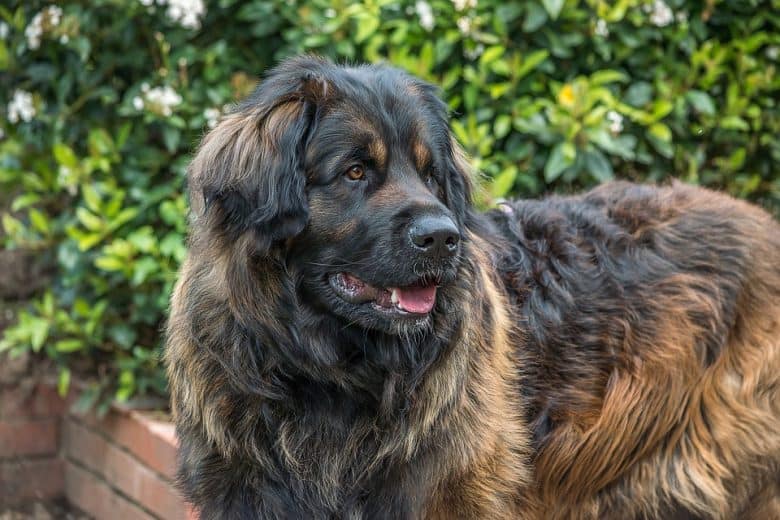
First-time dog owners may want to reconsider getting a Leonberger German Mountain Dog. Although they’re obedient and bright canines, they require consistent training, a firm leader, and plenty of socialization.
They’re a good match for moderately active owners who enjoy the outdoors. And that reddish-brown coat on a pooch with a lion-like mane will surely turn heads.
You can also count on them to be loyal companions and watchdogs that can also be skilled search and rescue dogs.
What can you say about Leonbergers? Have you seen or do you own one? Tell us all about it by commenting below.
Further reading: Similar breeds to Leonberger
- Sarplaninac
- Hovawart
- Pyrenean Mountain Dog
Reference
Cess is the Head of Content Writing at K9 Web and a passionate dog care expert with over 5 years of experience in the Pet Industry. With a background in animal science, dog training, and behavior consulting, her hands-on experience and extensive knowledge make her a trusted source for dog owners.
When not writing or leading the K9 Web content team, Cess can be found volunteering at local shelters and participating in dog-related events.
